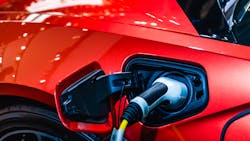Electric Cooperative In Virginia Seeks Regulatory Approval Of Electric Vehicle Pilot Program
Rappahannock Electric Cooperative (REC) on April 12 filed with the Virginia State Corporation Commission an amended application seeking approval of an electric vehicle (EV) smart charging pilot program.
REC said that to encourage off-peak EV charging, it proposes to implement the voluntary, experimental two-year EV pilot that is limited in scope to 200 participating residential customers in the first year. For the program’s second year, REC said that it proposes to have the ability to expand the pilot to include up to 400 participants, should REC determine it is appropriate.
Noting that the use of EVs is predicted to increase significantly with much of EV charging occurring at home, REC said that if its customers charge their EVs during on-peak hours, that will increase the REC’s capacity costs significantly. The EV pilot would encourage EV owners to charge during off-peak hours, which would help REC manage capacity costs associated with charging EVs and more fully utilize existing distribution, transmission, and generation systems. REC added that managing residential demand for generation service and delivery service would help increase REC’s load factor, minimize capacity related wholesale costs, as well as reduce upward pressure on residential rates that would likely occur if charging is done during on-peak hours.
The proposed pilot is a natural extension of REC’s efforts to promote EVs and beneficial electrification, REC said, adding that beneficial electrification aligns with the state’s 2018 Virginia Energy Plan, which recommends that the state “develop a comprehensive Virginia Transportation Electrification Plan … to accelerate vehicle electrification” and states that EVs “provide a ‘well-to-wheel’ emissions and energy consumption advantage over conventional vehicles running on gasoline or diesel.”
REC said that under the pilot, it would bill participants the same as its other customers for all electricity usage, including electricity used by their in-home EV chargers, as determined by the standard utility meter and under the standard residential tariff. However, REC added, for program participants, it would apply a fixed monthly EV smart charging bill credit.
REC said that it believes that that method — namely, the credit for off-peak EV charging — would be cost-effective and allow all EV owners to participate in the pilot, regardless of the make or model of their EV or the type of charger used. The bill credit for charging EVs during “Smart Hours” would be $7 per month, REC said, adding that it would provide the full bill credit to each participant for a 12-month period, as long as the participant maintains an active electric service account and remains voluntarily enrolled in the pilot.
The designated off-peak hours for the EV pilot are 9 p.m. to 5 a.m., and 10 a.m. to 2 p.m., 365 days a year. REC added that to participate in the pilot, participants must agree to program their EVs or EV chargers to charge their EVs during the Smart Hours designated in the tariff.
Among other things, REC said that the pilot would provide an opportunity for it to monitor the volume of energy consumed by EV chargers, as well as the time it was consumed, and to integrate that consumption data into the design of future rate offerings.
